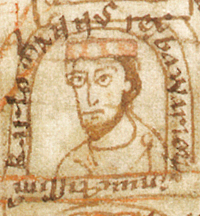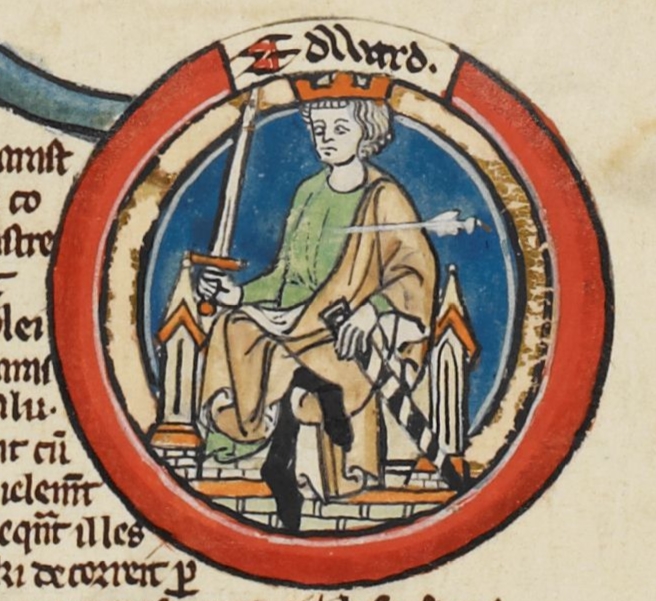|
Notker (abbot Of Saint Gall)
Notker (died 15 December 975Anton Gössi, "Kurzbiographien der Äbte", in Johannes Duft, Anton Gössi and Werner Vogler (eds.), ''Die Abtei St. Gallen'' (St. Gallen, 1986), p. 116.) was the abbot of the Abbey of Saint Gall from 971 to 975.J. M. Clark, ''The Abbey of St. Gall as a Centre of Literature and Art'' (Cambridge, 1926), p. 88. Notker was recommended for the office of abbot by his predecessor Purchart I. His election occurred on 18 May 971. He was the nephew of Abbot Thieto and Abbot Craloh as well as of Notker the Physician. Under Notker, the abbey's economy recovered. A testament of this recovery is the completion of the city walls that were commenced by his predecessor Anno. In order to improve the abbey's discipline and economy, Notker fell back on the constitution of Hartmut as well as on that of Abbot Kerbodo of Lorsch, the visiting abbot from the time of his predecessor Purchart. His severity knew limits however, wherefore he was named ''abba benignus'' ("gentle ab ... [...More Info...] [...Related Items...] OR: [Wikipedia] [Google] [Baidu] |
Abbey Of Saint Gall
The Abbey of Saint Gall (german: Abtei St. Gallen) is a dissolved abbey (747–1805) in a Catholic religious complex in the city of St. Gallen in Switzerland. The Carolingian-era monastery existed from 719, founded by Saint Othmar on the spot where Gallus had erected his hermitage. It became an independent principality between 9th and 13th centuries, and was for many centuries one of the chief Benedictine abbeys in Europe. The library of the Abbey is one of the oldest monastic libraries in the world. The city of St. Gallen originated as an adjoining settlement of the abbey. The abbey was secularized around 1800, and in 1848 its former church became a Cathedral. Since 1983 the abbey precinct has been a UNESCO World Heritage Site. History Foundation Around 612 Gallus, according to tradition an Irish monk and disciple and companion of Saint Columbanus, established a hermitage on the site that would become the monastery. He lived in his cell until his death in 646, and wa ... [...More Info...] [...Related Items...] OR: [Wikipedia] [Google] [Baidu] |
Purchart I
Purchart I (born c. 920/930; died 9 August 975) was the abbot of the Benedictine abbey of Saint Gall from 958 until 971. Life Purchart came from the family of the Udalrichings ( Udalrichinger). His father was probably count Ulrich V; his mother was named Wendelgard. He was probably born between 920 and 930. He came into the Abbey of Saint Gall at a young age as an oblate and was made deacon under Craloh. His first documented mention is dated at 959/60. His predecessor Ekkehart I, whom Craloh had selected to be his successor, but an injury following a riding accident prevented him from holding office. Ekkehart I thus selected Purchart to be successor and he subsequently became abbot. However, due to also being injured in a riding accident, he could not attend to all of his duties. He received the confirmation of immunity and all other rights and possessions from Pope John XIII in 967. Works Purchart was very popular with the monks due to his benevolence. However, economy and ... [...More Info...] [...Related Items...] OR: [Wikipedia] [Google] [Baidu] |
Thieto
Thieto (6 April ? – after 942) was abbot of the Benedictine Abbey of Saint Gall from 933 to 942. Life The name Thieto appears many times both in the book of vows of Saint Gall and in the monks' registers of the books of fraternisation. Therefore one cannot say anything conclusive about his life before becoming abbot. During his tenure as abbot he is mentioned in documents twice; once in an undated document and once in a certificate by Otto I from 7 April 940, in which Thieto is granted immunity, suffrage and the right of inquisition The Inquisition was a group of institutions within the Catholic Church whose aim was to combat heresy, conducting trials of suspected heretics. Studies of the records have found that the overwhelming majority of sentences consisted of penances, ... (German: Inquisitionsrecht). Important for the rest of his tenure was the fire which was far more destructive than the Hungarians' invasion in 926 during the tenure of his predecessor Engilbert. The f ... [...More Info...] [...Related Items...] OR: [Wikipedia] [Google] [Baidu] |
Craloh
Craloh (died 26 February 958) was abbot of the Benedictine Abbey of Saint Gall from 942 to 958. During his time in office, the first anti-abbot was elected. Life Craloh was the biological brother of his predecessor, Thieto, and was elected on 31 May 942. He is listed in the book of vows but his offices are not known before that. Because he only appears in the monks' registers from 895, one can assume that he entered the monastery after that point in time. There is a record of his work as a scribe in the form of a document from the 27 October 920. His role as abbot is mentioned for the first time in a document from the 12 June 947, in which Otto I granted him the right of coinage in Rorschach. Works Craloh's main task was a difficult one. He had to rebuild the abbey after being destroyed in a fire in 937. He was somewhat successful economically, as attested by eight sales or donation of goods to the Abbey of Saint Gall between 948 and 957. His strictness in wanting to reinstate ... [...More Info...] [...Related Items...] OR: [Wikipedia] [Google] [Baidu] |
Notker The Physician
Notker Physicus (died 12 November 975), sometimes called Notker II, was a monk at the Abbey of Saint Gall, active as a physician, painter, and composer. Besides ''physicus'' ("the physician"), he was also nicknamed ''piperis granum'' (pepper grain) on account of his strict discipline. Life and career Concerning his life it is only known that in 956 or 957 he became ''cellarius'' (cellarer), and in 965 ''hospitarius'' (hospitaller) at the Abbey of Saint Gall. He made several paintings, which were extolled by Ekkehard IV, who also mentions some antiphons and hymns, including "Rector aeterni metuende secli". Notker is probably to be identified with the ''Notker notarius'' (a notary) who enjoyed great consideration at the court of Otto I of Germany on account of his skill in medicine, and whose knowledge of medical books is celebrated by Ekkehard. In 940 this Notker wrote at Quedlinburg Quedlinburg () is a town situated just north of the Harz mountains, in the district of Harz i ... [...More Info...] [...Related Items...] OR: [Wikipedia] [Google] [Baidu] |
Anno Of Saint Gall
Anno may refer to: People *Anno of Saint Gall (died 954), Anti-Abbot of St. Gall *Anno II (Archbishop of Cologne) ( 1010–1075), Archbishop of Cologne from 1056 to 1075 * Anno (surname) * Anno Birkin (1980–2001), English musician *Hideaki Anno (1960-), Anime director Arts and media * ''Anno'' (video game series) * Anno Dracula series, fantasy novels by Kim Newman *''Anno's Journey'', a series of children's books by Mitsumasa Anno Other *Anno, Ivory Coast, a settlement in Lagunes District *Anno (Austrian Newspapers Online), a digitisation initiative of the Austrian National Library *Anno, a form of the Latin noun annum **Anno Hegirae, in the Islamic calendar, ("in the year of the Hijra"), abbreviated as AH or H **Anno Domini ("in the year of (Our) Lord"), abbreviated as AD, an epoch based on the traditionally-reckoned year of the conception or birth of Jesus of Nazareth **Anno Mundi ("in the year of the world"), abbreviated AM, a Calendar era counting from the creation of the ... [...More Info...] [...Related Items...] OR: [Wikipedia] [Google] [Baidu] |
Hartmut Of Saint Gall
Hartmut von St. Gallen (died 23 January after 905 in St. Gallen, Saint Gall) was abbot of the Abbey of Saint Gall. Hartmut (Old High German "of powerful courage and spirit"), was monk, pupil of Rabanus Maurus at the Princely Abbey of Fulda, and became Grimald's successor as Abbot of Saint Gall in 872. Otfrid of Weissenburg dedicated his Old High German "Liber evangeliorum", a kind of diatessaron in southern Rhenish Franconian languages, Rhenisch Franconian dialect, i. a. to his friend and fellow student Hartmut. As abbot, Hartmut, like his predecessor, generated an abundant construction activity. In 883, he abdicated and afterwards led a life of seclusion as recluse near the monastery in Saint Gall. He died on a 23 January after 905. Sources * Gössi, Anton: ''St. Gallen - Äbte: Hartmut, 872-883.'' in: ''Helvetia Sacra''. III: ''Die Orden mit Benediktinerregel''. 2/1: ''Frühe Klöster, die Benediktiner und Benediktinerinnen in der Schweiz''. Francke Verlag, Bern 1986, p.&nb ... [...More Info...] [...Related Items...] OR: [Wikipedia] [Google] [Baidu] |
Ministerialis
The ''ministeriales'' (singular: ''ministerialis'') were a class of people raised up from serfdom and placed in positions of power and responsibility in the High Middle Ages in the Holy Roman Empire. The word and its German translations, ''Ministeriale(n)'' and ''Dienstmann'', came to describe those unfree nobles who made up a large majority of what could be described as the German knighthood during that time. What began as an irregular arrangement of workers with a wide variety of duties and restrictions rose in status and wealth to become the power brokers of an empire. The ''ministeriales'' were not legally free people, but held social rank. Legally, their liege lord determined whom they could or could not marry, and they were not able to transfer their lords' properties to heirs or spouses. They were, however, considered members of the nobility since that was a social designation, not a legal one. ''Ministeriales'' were trained knights, held military responsibilities and surr ... [...More Info...] [...Related Items...] OR: [Wikipedia] [Google] [Baidu] |
Zoological Garden
A zoo (short for zoological garden; also called an animal park or menagerie) is a facility in which animals are kept within enclosures for public exhibition and often bred for conservation purposes. The term ''zoological garden'' refers to zoology, the study of animals. The term is derived from the Greek , , 'animal', and the suffix , , 'study of'. The abbreviation ''zoo'' was first used of the London Zoological Gardens, which was opened for scientific study in 1828 and to the public in 1847."Landmarks in ZSL History" , Zoological Society of London. In the alone, zoos are visited by over 181 million people annually. Etymology [...More Info...] [...Related Items...] OR: [Wikipedia] [Google] [Baidu] |
Notker The Stammerer
Notker the Stammerer ( – 6 April 912), Notker Balbulus, or simply Notker, was a Benedictine monk at the Abbey of Saint Gall active as a poet, scholar and (probably) composer. Described as "a significant figure in the Western Church", Notker made substantial contributions to both the music and literature of his time. He is usually credited with two major works of the Carolingian period: the ''Liber Hymnorum'', which includes an important collection of early sequences, and the earliest biography of Charlemagne, ''Gesta Caroli Magni''. His other works include a biography of Saint Gall, the ''Vita Sancti Galli'', and a martyrology. Born near the Abbey of Saint Gall, Notker was educated alongside the monks Tuotilo and Ratpert; all three were composers, making the Abbey an important center of early medieval music. Notker quickly became a central figure of the Abbey and among the leading literary scholars of the Early Middle Ages. A renowned teacher, he taught Solomon III, the bish ... [...More Info...] [...Related Items...] OR: [Wikipedia] [Google] [Baidu] |
Notker Labeo
Notker Labeo (c. 950 – 28 June 1022), also known as Notker the German ( la, Notcerus Teutonicus) or Notker III, was a Benedictine monk and the first commentator on Aristotle active in the Middle Ages. "Labeo" means "the thick-lipped one". Later he was named ''Teutonicus'' in recognition of his services to the German language. Life and career He was born about 950, from a noble family of Thurgau, and he was a nephew of Ekkehard I, the poet of '' Waltharius''. He went to the Abbey of Saint Gall when only a boy, and there acquired a vast and varied knowledge by omnivorous reading. After finishing his education, he continued in the abbey as a teacher and then head of the school under abbot Burckhard II. His contemporaries admired him as a theologian, philologist, mathematician, astronomer, connoisseur of music, and poet. He tells of his studies and his literary work in a letter to Bishop Hugo of Sitten (998–1017), and we also know of his activities through texts from his pupil ... [...More Info...] [...Related Items...] OR: [Wikipedia] [Google] [Baidu] |
975 Deaths
Year 975 ( CMLXXV) was a common year starting on Friday (link will display the full calendar) of the Julian calendar. Events By place Byzantine Empire * Arab–Byzantine War: Emperor John I raids Mesopotamia and invades Syria, using the Byzantine base at Antioch to press southwards to Tripoli. He conquers the cities of Baalbek, Damascus, Sidon, Tiberias and Caesarea, but fails to take Jerusalem. Europe * October 15 – Oberto I (Obizzo), an Italian count palatine, dies. The Marca Obertenga (Eastern Liguria) is divided among the Obertenghi family. * Emperor Otto II (the Red) leads a punitive expedition against Boleslaus II, duke of Bohemia (approximate date). England * July 8 – King Edgar I (the Peaceful) dies at Winchester after a 16-year reign. He is succeeded by his 12-year-old son Edward II (the Martyr) as ruler of England. Africa * December 21 – Caliph Al-Mu'izz dies in Egypt after a 22-year reign in which he has extended his realm from ... [...More Info...] [...Related Items...] OR: [Wikipedia] [Google] [Baidu] |




